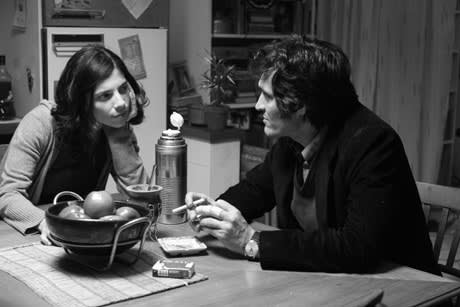The marketing of Tetro and subsequent buzz focuses greatly on Coppola's seeming "return to form," having penned this, his first original screenplay since The Conversation in 1974. He's adapted a number of novels in the interim, tossing out bland commercial fare like Jack and The Rainmaker, and stinking up the art film world with the dreadful, but pretty, Youth Without Youth. And, amongst other things, Tetro is indeed the work of an artisan, a man that understands the medium and his work in relation to his peers, both modern and classic. It also clarifies why it is that Coppola doesn't often write original screenplays: he has nothing to say. Gorgeously composed with still, black and white photography that takes full advantage of space and shadows, framing moods juxtaposed with colour flashbacks and lush, expressionistic dance pieces, this family drama unfolds like a drunken Greek tragedy, with a nod to the works of Fellini and Truffaut. Welcoming narrative familiarity with a pointedly unwelcome reunion between brothers Tetro (Vincent Gallo) and Bennie (Alden Ehrenreich), this operatic, partly indulgent and overly baroque tale of father-son histrionics and ego competition quickly eschews convention, frequently defying the rules, if only to acknowledge their existence. A DVD commentary track provided by Coppola details these specificities, using the example of a gun revealed early on, only to never reappear, as a means of defining oneself in contrast to another (take that, Jean-Luc Godard). But for all these references, with glimmering light warning the boys, like Icarus, not to fly too close to the sun as they battle, mediated by Tetro's lover Miranda (Mirabel Verdu), about writing and family history, there is no ire or purpose. The observation that male identity seeks only to fuel its ego, making the conflict of fatherhood implicit, is indeed wise, but isn't handled with any cultural relevance or context; it's simply presented and acknowledged much like the many cinematic and literary references. It's as if Coppola is telling us that he's well read, but essentially content with the way the world is, having little to add to the artistic canon. Since this isn't flippant commercial fare where the message is less relevant than putting asses in theatre seats, the question becomes mainly: "what's the point?" The many DVD supplements on cinematography, ballet and rehearsals attempt to answer this, but mostly just show technical prowess and an impressive attention to detail.
(Mongrel Media)Tetro
Francis Ford Coppola

BY Robert BellPublished May 6, 2010